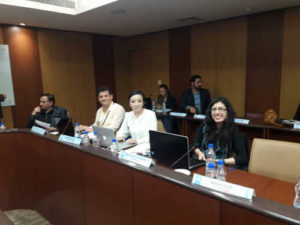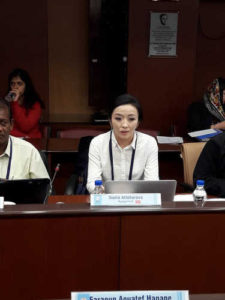Report on ITEC Capacity Building on Science Diplomacy course by RIS
On the ITEC by Government of India I have been nominated for the scholarship of ITEC Capacity Building Program on Science Diplomacy by RIS.
Date and venue
Within the framework of this scholarship program on 8−19 January, 2018 I have participated on intensive, certified course Science Diplomacy, RIS, New Delhi. Course took place in RIS. RIS is located in India Habitat Centre, which houses a number of organizations working on various socio-economic issues, revolving around common concern for habitat. Thus, there exists a unique synergy within the IHC complex itself that helps the various research bodies housed here to work together for unique institution building.
Program team, lecturers
Sachin Chaturvedi-Director General, RIS; Ambassador Amar Sinha; Dr. Jairam Ramesh, Member of Parliament; Dr. S.R. Rao, Advisor, DBT, Goevrnement of India, Professor Thomas Pogge, Yale University, USA; Dr. Miltos Ladikas, ITAS Germany; Dr.V.Siddhartha, Former Secretary of Science Advisory Council to the Prime Minister of India; Dr. Bhaskar Balakrishnan, Former Indian Diplomat; Dr. Pallava Bagla, Science Reporter and Columnist, NDTV; Mr. Dinesh C. Sharma, Managing Editor, India Science Wire; Dr. R.K. Mittal, OSD, DARE, ICAR; Mr. Chandra Bhushan, Centre for Science and Environment; Prof. Pranav N. Desai, Jawarharlal University; Prof. Ashok Parthasarathi, Former Secretary, Government of India; Dr. Mukesh Kumar, Director Indo-French Centre for the Promotion of Advanced Research; Dr. Arabinda Mitra, Head -International Cooperation, DST; Dr. T. Ramaswami, Former Secretary, DST; Dr. K. Ravi Srinivas, RIS; Dr.S.K.Saxena, EIC; Mr. Pritam Banerjee, Deutche Post DHL; Dr. H. Purushotham, CMD, Ministry of S&T; Prof. Saradindu Bhaduri, Centre for Studies in Science Policy, JNU; Dr. Anurag Agarwal, Director CSIR-IGIB; Dr. S.K.Mohanty, RIS; Prof. Ambul D.Sagar, Indian Institute of Technology; Dr. Malti Goel, Former Advisor and Scientist ‘G', Ministry of Science and Technology; Amb.
Agenda
| Day 1 Inaugural and opening ITEC Batch and Science Diplomacy | In inaugural session Institute’s director welcomed and introduced each participant. In this session I could get information on how does ITEC contribute to Science Diplomacy. Science, Technology and Global Society. Technology Assessment and Science, Technology Policy |
| Day 2 Theoretical and Conceptual Framework of Science Diplomacy | Theoretical and Conceptual Framework for Science DiplomacyNew frontiers in Science Diplomacy |
| India’s Own Experiences across specific sectors | Panel discussion on India’s Own Experiences across specific sectors: Chandrayaan space project Space Collaboration Agriculture |
| Day 3 Developing Countries in Realm of Science and Diplomacy and South-South Cooperation | South-South CooperationIndian Ocean Rim AssociationTechnology at the Core: Science and Technology with Indira GandhiIndo-French relations |
| Day 4 India’s Science Diplomacy | India’s successful satellite launch shows ‘science diplomacy in a new orbitModi’s space diplomacyGlobalization of Innovations: Changing Nature of India’s Science and Technology Cooperation Policy |
| Day 5 Field trip | Field visit to International Solar Alliance |
| Day 6 and 7 Cultural Visit | Trip to AgraTrip to Jaipur |
| Day 8 Technology, Trade and Science Diplomacy | SPS/TBT Trade BarriersDigital Trade Role of Science Diplomacy in Technology Transfer |
| Day 9 New Issues and Science Diplomacy | Grassroots Innovation Artificial Intelligence Blue Economy |
| Day 10 Science Diplomacy: SDGs and Development Priorities | Sustainable Development Goals: PolicySDG: Science and Technology |
| Day 11 | Presentation by ParticipantsDelhi sightseeing |
| Day 12 Concluding day | Valedictory Session and Distribution of CertificateFarewell Dinner |
Electronic and hard copy materials provided with:
Following valuable books provided with:
1. Logic of Sharing — Sachin Chaturvedi 2. The South Shaping The Global Future — Branislav Gosovich 3. Science and Technology Diplomacy and Sustainable Development in the Developing Countries
4. Institutional Architecture for South-South Cooperation
5. Global Science Diplomacy as a New Tool for Global governance — Luk Van Langenhov
6. Number of different Electronic books, articles, reports, publications by RIS, UN, UNEP, Swiss Academy of Medical Sciences, The World Academy of Sciences, etc.
Field trip to Solar Alliance, and National Institute of Solar Energy
National Institute of Solar Energy as an apex institute of the Ministry of New and Renewable Energy, in the area of solar energy is undertaking activities related to research & development, testing, certification, standardization, skill development, resource assessment and awareness in the field of solar energy and associated technologies.
Within the framework of the course program I had an opportunity to visit National Institute of Solar Energy, where specialists of the institute demonstrated how to get solar energy with no harming to ecology, environment. Institute’s officials agreed to make a partnership, projects in relevant fields with our university NSU.
Out of the program events
January 15, 2018, I attended lecture «Technologies and Strategies for Achieving Excellence in Health Care for Indian Masses» by Dr. Vishwa Mohan Katoch, NASI-ICMR Chair on Public Health Research, developer modern methods of rapid diagnosis of TB, leprosy, DNA chips, DNA fingerprinting methods.
January 16, 2018, I participated in Meeting of Signing of MoU (Memorandum of Understanding) between RIS and IORA Secretariat in the presence of V.K.Singh, Minister of State for External Affairs, Government of India.
Tour to Agra, Tadj Mahal and Jaipur
This was the most exciting part of my trip to India. RIS organized tour sightseeing to Agra, where I could see the one of the wonders of the world Tadj Mahal. Next tour was to Jaipur, the capital of Rajastan state, where I could visit Hawa Mahal Palace. Hawa Mahal is a palace in Jaipur with construction of red and pink sandstone, which also calls Women’s Chamber.
To the great fortunately, I had a chance to visit Presidential Palace in Delhi, because the Palace opens its door for a month once in a year, in January month only. Indian markets are the most populated and colorful markets in the world.
Outcomes
Outcomes of the course was that by the end of the course I prepared my own publication «SCIENCE DIPLOMACY FOR KYRGYZ-INDIAN TRADE-ECONOMIC AND SCIENTIFIC-SCIENTIFIC-TECHNICAL COOPERATION» and made presentation on publication. As a result RIS approved the publication. https://www.ssc-globalthinkers.org/sites/default/files/2018−12/SSC_Role%20of%20Science%20Diplomacy.pdf
Summary
Each lectures and panel discussion offered by RIS program were relevant and useful for my research and for me personally. I could learn quite new knowledge and skills different from what I have studied before. Meeting with Indian outstanding academics, professors in each lectures was enriching, I could learn a lot of things discussing, and giving questions in my interested topic on Science Diplomacy. Each professor has comprehensive vision and rich experience in particular field of study. Moreover RIS has close contact to Government organizations, international organizations, embassies, universities, research institutes, which be a real bridge for NSU to make a further partnership relations, realizing joint projects.
All of the parts of the course will help me for my further publication and research, develop following skills to formulate research questions in an appropriate coherent form, connect the research questions with the most appropriate research methodology, discuss critically the best approaches to the discussion of the research problem, recognize the quality of scientific publications, analyze and evaluate critically the source of information. Gained skills and knowledge from this course I will use my further research.
Conclusion
Science Diplomacy is an approach of diplomatic relations which focuses significantly on bilateral, regional and multilateral cooperation and partnerships among states in the fields of Science, Technology and Innovation to address mutual challenges regarding development, trade, investment, and technology and South-South Cooperation. As a matter of fact, this training course provided important themes which reflected the real work conducted in India. The themes encompassed research work in science and technology in agriculture and health sectors, climate change, and the role of Science Diplomacy in accomplishing sustainable development goals, technology transfer, South-South Cooperation and Blue economy.
For Kyrgyzstan, Science Diplomacy is playing a vital role to engage country with other countries via promoting cooperation and partnership in the field of science, technology and innovation to support implementation of the country’s industrial development policy which focuses on building human resource, formulating policy, establishment concerned institutions, strengthening the existing institution capacity, and creating exchange programmes on the field and so on.
Cultural overview
India is incredible, the world’s most exotic destination. The land of maharajahs and the Raj, Krishna, Buddha, Ghandi, Nehru, saffron, silk and spices, towering Himalayan mountains and luxuriant beaches, ancient Hindu shrines and magnificent Muslim monuments.
Prepared by
Siuita Attokurova
English instructor of German languages department
Philology faculty



